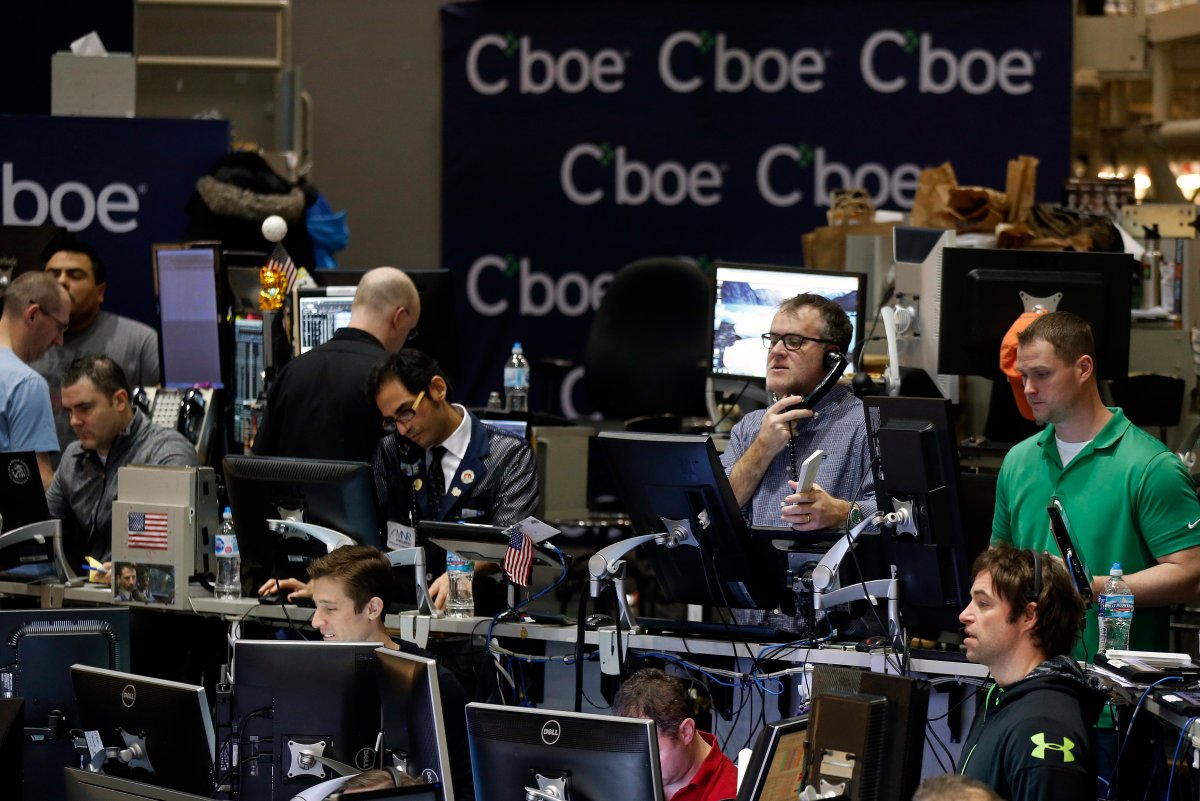Bitcoin futures started trading on Sunday, in what marked the virtual currency’s debut on a major U.S. stock exchange.

The futures are being offered by the Chicago Board Options Exchange, or CBOE, and allow investors to bet on the future price of Bitcoin without having to hold any digital tokens, as the contracts are settled in cash.
READ MORE: Bitcoin futures rise as virtual currency makes debut on major exchange
Futures trading is for the pros, though, so what does this mean for all the small investors who’ve piled into Bitcoin?
A less volatile Bitcoin?
A futures market “could make Bitcoin itself less volatile,” said Joshua Gans, who holds the Jeffrey S. Skoll Chair in Technical Innovation and Entrepreneurship at the University of Toronto’s Rotman School of Management.
A trade in Bitcoin futures, in other words, could somewhat smooth out the roller-coaster ride that comes with holding any Bitcoins, the price of which often rises and falls by double-digit percentages in the span of 24 hours.
READ MORE: Tempted to invest in Bitcoin? Here are a few things to consider
On Monday, financial markets seemed to think the cryptocurrency would rise further but at a significantly slower pace than it has in recent weeks.
Just over 15 hours after trading began, the Bitcoin future contract that settles in January was trading at $17,910, or 10 per cent above bitcoin‘s “spot” price – the price at which it is currently changing hands – which was $16,450, according to Reuters.
This suggests investors believe the digital currency will appreciate by only 10 per cent over the course of a month, a fraction of the over 300 per cent climb it registered over the past four weeks or so.
Bitcoin is up more than 1,500 per cent so far in 2017, having started the year at less than $1,000.
READ MORE: Bitcoin for Canadians: Where to buy it – and the taxes you’ll pay
But any dampening of Bitcoin’s volatility is likely going to be limited, Campbell Harvey, professor of finance at Duke University’s Fuqua School of Business told Global News.
That’s because there’s a massive disagreement among investors about what the value of Bitcoin should be, now or in the future. Some investors believe the currency is worth zero, others have been predicting it will reach $1 million.
That spread is far wider than the disagreements investors have about the value of a stock or currency and is the main reason for Bitcoin’s wild ups and downs, according to Harvey.
Futures may make it easier to bet on Bitcoin and to bet against it, but they do nothing about the issue that there are no commonly accepted metrics to determine the digital currency’s value, according to Harvey.
WATCH: Bitcoin 101 for Canadians: a beginner’s guide to the digital currency

You might soon see Bitcoin ETFs
The thing futures trading does for Bitcoin is lend it legitimacy.
Further to that, Bitcoin futures might open the door to Bitcoin exchange-traded funds (ETFs), said Harvey.
READ MORE: Bitcoin hits $16K before major cryptocurrency exchange Coinbase crashes
An ETF is a security that tracks the price of a stock index, a commodity, bonds, or a basket of assets.
Regulators have shot down various attempts to introduce ETFs that track the price of Bitcoin in the U.S. out of concern that Bitcoin prices on unregulated digital currency exchanges could be manipulated, said Harvey. But that concern doesn’t exist for Bitcoin futures trading on a major exchange that’s fully regulated.
The trouble with that is that while Bitcoin ETFs would likely be volatile and risky like virtual currency itself, they might attract even more retail investors to it, said Harvey.
And while many small-time Bitcoin buyers might have made only very small purchases, Bitcoin ETFs could invite larger investments by inexperienced investors.
Americans can’t put a Bitcoin account in their 401k retirement plan, but they could put a Bitcoin ETF into it, noted Harvey.
WATCH: Bitcoin: hot investment opportunity or looming bubble?

Other major exchanges to follow suit on Bitcoin futures
Soon, professional investors hoping to buy Bitcoin futures will have several options.
Chicago’s other major exchange, the Chicago Mercantile Exchange (CME), is expected to launch its own futures contract on Dec. 17.
And Nasdaq is planning to introduce Bitcoin futures sometime next year.
But while Bitcoin’s ride into the financial mainstream seems to be gaining steam, there are still a number of tricky questions facing investors and regulators.
For one, there’s the fact that different Bitcoin exchanges report different prices for the virtual currency. That’s why the CME futures will be based on the prices of at least four different Bitcoin exchanges, said Harvey.
Those traded on the CBOE, on the other hand, are based on the auction price of bitcoin in U.S. dollars on the Gemini Exchange, which is owned and operated by virtual currency entrepreneurs and brothers Cameron and Tyler Winklevoss.
READ MORE: Winklevoss twins are now Bitcoin billionaires. What that means for the rest of us
But a thornier issue is how futures exchanges would handle what digital currency geeks call “a fork,” in which Bitcoin has spun off different versions of itself. This has happened several times in the past, with the birth of Bitcoin Cash and Bitcoin Gold, for example, which have acquired considerable momentum in their own right.
“How would Bitcoin futures handle another fork?” asked Harvey.
That question doesn’t seem to have an answer yet.
– With files from Reuters




Comments